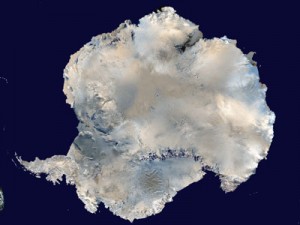
A view from space of Antarctica. Source: NASA
Antarctica is a unique continent because is mostly covered in ice and, importantly, it is the only continent that has never been settled by humans until scientific bases were established in the 20th C. This makes it an international space which has implications for the environmental regulatory regimes that have developed over time as well as the way we view the continent. Without a popular tradition of natural history, or amateur ornithology, or locals dependent on wild resources from which a conservation ethic might emerge, it was trained, international biologists who led the development of nature protection and conservation in Antarctica.
The guest on this podcast episode is Alessandro Antonello, a PhD candidate in the School of History at the Australian National University’s Research School of Social Sciences, in Canberra, Australia. In this podcast he explores the scientific, environmental and diplomatic aspects of Antarctic history, in particular from the inception of the Antarctic Treaty in 1959. He also examines changing conceptions of the Antarctic in the second half of the 20th century and places this in a wider historical context.
Further reading
Marcus Haward and Tom Griffiths (eds.), Australia and the Antarctic Treaty system: 50 years of influence, UNSW Press, 2011.
Acronyms used
AMCAFF: Agreed Measures for the Conservation of Antarctic Fauna and Flora
SCAR: Scientific Committee on Antarctic Research
CCAMLR: Convention on the Conservation of Antarctic Marine Living Resources
CSIRO: Commonwealth Scientific and Industrial Research Organisation
CCAS: Convention for the Conservation of Antarctic Seals
IGY: International Geophysical Year (1957)
Music credits
“Where You Are Now” by Zapac, available from ccMixter
“2012Piano” by snowflake, available from ccMixter


Recent Comments